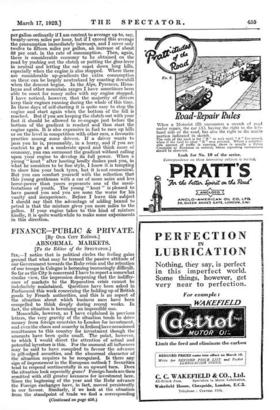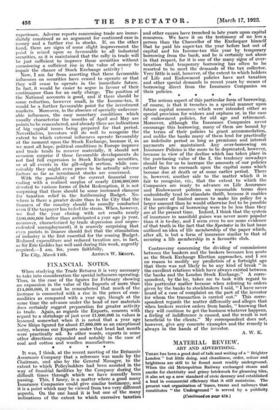FINANCE—PUBLIC & PRIVATE.
[By OUR CITY EDITOR.]
ABNORMAL MARKETS.
[To the Editor of the SPECTATOR.] notice that in political circles the feeling gains ground that what may be termed the .passive attitude of our Government towards the Ruhr crisis and the retention of our troops in Cologne is becoming increasingly difficult. So far as the City is concerned I have to report a somewhat similar view, the impression deepening that the indiffer- ence of markets to the Reparation crisis cannot be indefinitely maintained. Questions have been asked in Parliament this week concerning the holding up of British goods by French authorities, and this is an aspect of the situation about which business men have been compelled to think, deeply during recent weeks. In fact, the situation is becoming an impossib16' one. Meanwhile, however, as I have explained in previous letters, the very gravity of the situation tends to drive money from foreign countries to London for investment, and even the chaos and anarchy in Irelancihave occasioned remittances to this country for investment though the amounts have been quite small. The point, however, to which I would direct the attention of actual and potential investors is this. For the moment all influences may be said to have conspired to favour the advance in gilt-edged securities, and the abnormal character of the situation requires to be recognized. Is there any sign of improvement in the European outlook ? Securities tend to respond sentimentally in an upward turn. Does the situation look especially grave? Foreign funds are then remitted with still greater keenness for investment here. Since the beginning of the year and the Ruhr advance the Foreign exchanges have, in fact, moved persistently in our favour. Similarly, if we look at the situation from the standpoint of trade we find a corresponding (Continued on page 456.) experience. Adverse reports concerning trade are imme- diately construed as an argument for continued ease in money and a further rise in stocks. If, on the other hand, there are signs of some slight improvement the point is seized upon as favourable to all industrial securities, as it is maintained that the rally in trade will be just sufficient to improve those securities without occasioning a sufficient rise in the value of money to impair the chance of Stock Exchange activity ! Now, I am far from asserting that these favourable influences on securities have ceased to operate or that they will cease to operate in the immediate future. In fact, it would be easier to argue in favour of their continuance than for an early change. The position of the National accounts is good, and if there should be some reduction, however small, in the Income-tax, it would be a further favourable point for the investment markets. Moreover, in the absence of specially unfavour- able influences, the easy monetary conditions which usually characterize the months of April and May are points to be remembered, and already there are indications of big capital issues being prepared for that period. Nevertheless, investors will do well to recognize the extent to which external influences operate favourably at the moment upon the Stock Exchange, because if, as we must all hope, political conditions in Europe improve and trade tends to recover materially, it should not occasion surprise if those favourable developments do not find full expression in Stock Exchange securities, or at all events in the gilt-edged section, while con- ceivably they might even prove to be actually adverse factors so far as investment stocks are concerned.
With the possibility of the current financial year ending with a realized surplus of nearly £100,000,000 devoted to various forms of Debt Redemption, it is not surprising that there should be some increased clamour for taxation relief in the forthcoming Budget. No- where is there a greater desire than in the City that the finances of the country should be soundly conducted even if the taxpayer has to feel the strain. When, however, we find the year closing with net results nearly £100,000,000 better than anticipated a year ago (a year, moreover, characterized by trade depression and unpre- cedented unemployment), it is scarcely surprising that even purists in finance should feel that the stimulation of industry is the first essential for the coming Budget. Reduced expenditure and reduced taxation are, in fact, as Sir Eric Geddes has well said during this week, urgently required.—I. am, Sir, yours faithfully,











































 Previous page
Previous page